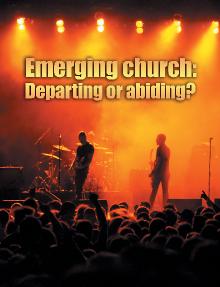This is a description of “the Emerging Church and Young Seekers” from christianity.about.com
Solomon’s Porch, in Minneapolis, Minnesota, is a good example. Founding pastor Doug Pagitt saw thousands of college students in the area and knew they had dropped out of traditional church services. Pagitt offered them something different.
Instead of preaching from a pulpit, Pagitt sits on a stool and engages the participants in dialogue. Instead of rows of pews facing forward, Solomon’s Porch has sofas, arranged in a circle. And instead of organ music and 500 year-old hymns, this church has guitars and contemporary music.
Other churches in the movement hold young texters’ attention by projecting fleeting visuals to illustrate messages, accompanied by fast-paced discussion. Some include activities such as signing one’s name on a cross or walking a labyrinth. Worship may engage the senses with incense, candles, and bells.
While some of these new ways of doing church services are a departure from evangelical Christianity, others resemble ancient symbols and rituals of Roman Catholicism.
The writer of this article correctly observes that mixed within the desire to reach these young people is the incorporation of false religions and dubious elements that would probably not be valid for true Christianity.
The writer continues…
This open-minded concept of many truths appeals to young seekers with friends who are Muslims,Buddhists, agnostics and atheists. Pluralism rejects the evangelical teaching that Jesus Christ is theonly way to heaven, which many think is judgmental and intolerant.
At the heart of this moment is not just a rejection of the forms of traditional Christianity, but also a rejection of the essential doctrines (Fundamentals of the Christian faith) of traditional Christianity.
There has to be a watershed here. Either a person accepts what the Bible says as being God’s correct message, or it is not. If it is not, then they should not even mention Jesus, Christ, the Holy Spirit, church, etc. Let them call their manufactured religion with other names. They shouldn’t pretend to be about what the Bible says if they are going to reject what the Bible says in the end analysis.
In this article in cbn.com,
Many of the churches actually began encouraging dialogue and conversations about faith within the church and started to re-think what the role of a pastor looked like in some Sunday morning settings.
“I really got into the heavy level of participation because I wanted to devalue the role of the pastor a bit,” influential pastor of Solomon’s Porch Doug Pagitt said in an interview with ChristianBook.com. “I was trying to change that paradigm and figure out if I can personally and authentically be a pastor without having to dominate a group of people.” Churches like his started holding services that featured Q&As, discussion groups and forums for artists to express spiritual ideas through art and music.
If you understand what is going on, these people have absolutely no view of the authority of Scripture. How can we “devalue the role of pastor”? from what? From what the Bible presents it as? That is the point. There is no reference back to Scripture as the authority of God instructing us in HOW WE ARE TO BELIEVE AND PRACTICE OF FAITH! What they are doing is first presuming that God has not spoken, or worse, God has spoken but we are not going to listen, and then they go about to create their own ideas, structures, forms, methods, etc for religion. Their break is not with the traditional church, but with the Bible. We must make that absolutely clear!
